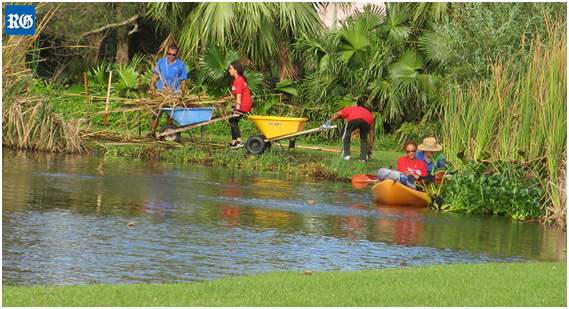Recent News
Students shine in Reef Watch art contestThursday, June 25, 2015
Two Warwick Academy students are the proud winners of prizes in the recent Reef Watch Art Competition.
Ocean guardians promote Reef Watch
Tuesday, June 23, 2015
Bermuda’s ocean guardians were at the Johnny Barnes roundabout to promote Saturday’s citizen science initiative Reef Watch.
Trunk Island to become outdoor classroom
Wednesday, June 17, 2015
It is one of the most pristine and untouched habitats left in Bermuda.
Aon staff show their community spirit
Friday, June 12, 2015
Aon staff have taken part in an international Global Service Day, assisting several local charities and community projects.r.
Open-air classroom for Florida students
Thursday, June 11, 2015
Bermuda has provided an open-air classroom for students from Flagler College in Florida, who just got their second round of hands-on research experience.
About
GovernanceAbout Us
Newsletter
Latest News
Gift & Bookstore
Contact
General Inquiries
info@bzs.bm
Latest News
All the latest updates and news from the Bermuda Aquarium, Museum, and Zoo, one of Bermuda's leading visitor attractions!
Jonathan Bell
Published Jan 16, 2018 at 8:00 am (Updated Jan 16, 2018 at 6:41 am)

HSBC volunteers help a Bermuda Zoological society team clean up
Cloverdale Pond in Smith's (Photograph supplied)
Two ponds have been cleaned up courtesy of an island conservation programme.
Cloverdale Pond in Smith’s and Southampton’s Evan’s Pond, a refuge for endangered species, were improved through the Bermuda Zoological Society’s wetlands remediation programme.
The scheme, which became the HSBC global water programme for Bermuda in 2014, was designed to remove toxic petroleum compounds from ponds.
The build-up of the poisonous hydrocarbons is a threat to the island’s two endemic killifish species, as well as native diamondback terrapins, which are a protected species.
The compounds, which come from oil, water runoff and vehicle exhausts, can be broken down by bacteria when the pond sediments are aerated.
The two-year grant from HSBC allowed the proposal to be tested in the field.
Volunteers also took part, with help from the Department of Environment and Natural Resources.
The BZS said Cloverdale was chosen first because of its small size, its “known severe effects on wildlife” and the absence of protected species in the water.
Evan’s Pond was selected as the second test site because of its small population of killifish.
The ponds were divided into sections and aerated for six to eight hours a day with solar powered compressors.
Hydrocarbon levels saw a major reduction over the course of a year.
The next site for remediation is the South Pond at the Mid Ocean golf course, where the hatching of diamondback terrapins has been hampered by pollution.


